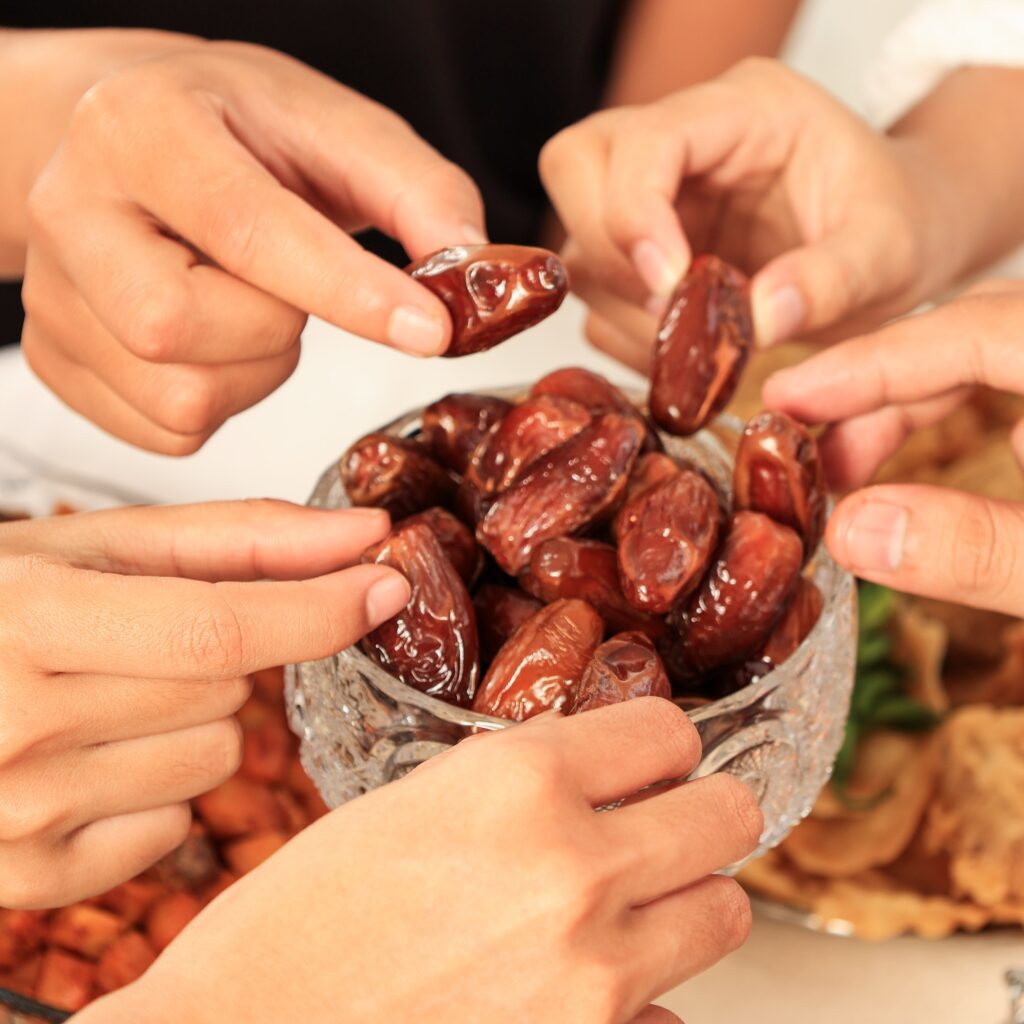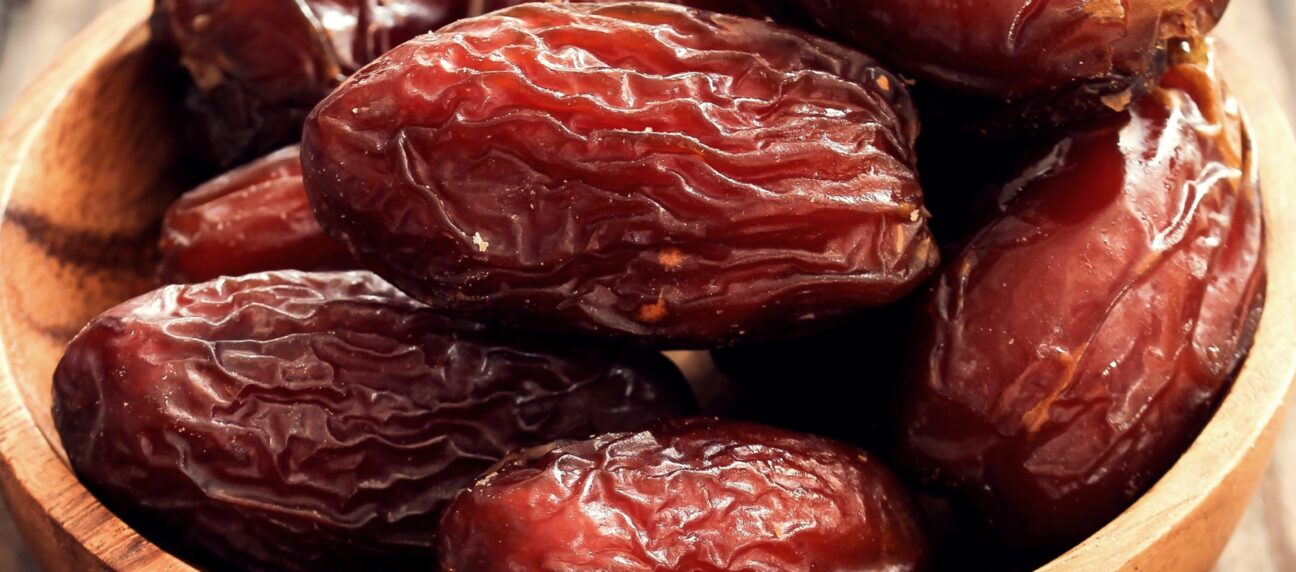In Islam, dates are more than just a fruit; they are a symbol of sustenance, faith, and divine blessing. From the time of the Prophet Muhammad (PBUH), dates have been a staple in Islamic tradition, especially during the holy month of Ramadan when Muslims around the world break their fast with them. Let’s explore the deep-rooted spiritual significance of dates in Islam, along with the powerful health benefits that make this fruit a valuable addition to our diets.
Spiritual Significance of Dates in Islam
Dates in the Quran
The Quran highlights dates as one of Allah’s many gifts, portraying them as a source of nourishment and sustenance. The most notable mention occurs in Surah Maryam (19:23-25), where Allah instructed Maryam (Mary) to eat dates to gain strength during childbirth. This moment emphasizes dates’ nourishing qualities, showing how they provided essential energy during a physically challenging time.
Another key reference appears in Surah An-Nahl (16:11), where dates are listed alongside grapes, olives, and other fruits as symbols of Allah’s provision for humankind. The verse reminds believers to reflect on these blessings, acknowledging them as signs of divine generosity.
To learn more about foods in the Quran, explore the Quranforu article on Quranic foods and their spiritual significance.
Prophetic Guidance on Eating Dates
The Prophet Muhammad (PBUH) frequently encouraged the consumption of dates, establishing their role in Islamic practice. His traditions, or Sunnah, include:
- Breaking the Fast with Dates: During Ramadan, Muslims are encouraged to break their fast with dates, following the Prophet’s example. The Prophet said, “If any of you is fasting, let him break his fast with dates; if he cannot find any, then with water.” This practice provides the body with instant energy and is a revered Sunnah that Muslims worldwide uphold each Ramadan.
- Healing Properties of Ajwa Dates: Ajwa dates, a variety native to Medina, are especially revered in Islam. The Prophet Muhammad (PBUH) is reported to have said, “He who eats seven Ajwa dates every morning will not be affected by poison or magic on the day he eats them.” This Hadith underscores the unique physical and spiritual benefits attributed to Ajwa dates.
- Sunnah of Consuming Dates Regularly: The Prophet encouraged regular consumption of dates, recognizing them as a complete food source. Integrating dates into daily life not only aligns with the Sunnah but also promotes health benefits acknowledged by modern nutrition.
To learn more about the Prophetic Diet, explore Quranforu’s resource on Sunnah foods and their health benefits.

Nutritional Profile of Dates: A Powerhouse of Health Benefits
Dates are a nutrient-dense fruit, providing essential vitamins, minerals, fiber, and natural sugars that support physical well-being, especially during fasting.
1. Natural Sugars for Instant Energy
Dates contain glucose, fructose, and sucrose, making them an ideal energy source. After fasting, these sugars quickly restore blood glucose levels, giving an immediate energy boost without causing a blood sugar spike. This makes dates a perfect food for breaking the fast, as they provide rapid nourishment and prevent overeating at the evening meal.
2. High Fiber Content for Digestive Health
The fiber in dates helps regulate digestion, ensuring healthy bowel movements and easing digestion after a day of fasting. This fiber also contributes to a feeling of fullness, which is beneficial for maintaining balanced food intake during Ramadan.
3. Rich in Essential Minerals
Dates are packed with minerals that support overall health, including potassium for heart health and magnesium for muscle relaxation. The high iron content in dates supports blood health, making them particularly beneficial for those with low iron levels.
4. Loaded with Antioxidants
Dates contain antioxidants like flavonoids and carotenoids, which protect the body from inflammation and oxidative stress, further supporting overall well-being.
Learn more about the health benefits of fasting in Islam and how dates play a role in maintaining wellness during Ramadan.
Famous Types of Dates
There are various types of dates, each with unique flavors and health benefits. Among these, Ajwa dates hold a special place due to their association with the Prophet Muhammad (PBUH). Here’s an overview of popular date varieties:
Ajwa Dates: The Holy Date
Ajwa dates are often called the “Holy Date” because of their revered status in Islam. Dark and slightly wrinkled, Ajwa dates have a unique flavor and a soft texture. Cultivated primarily in Medina, they are particularly prized for their healing properties.
Medjool Dates: The King of Dates
Known as the “King of Dates,” Medjool dates are larger and have a rich caramel-like flavor. These dates are excellent for breaking the fast, as they offer a quick source of energy with a satisfying sweetness.
Sukkary Dates: Naturally Sweet
Sukkary dates, popular in the Arabian Peninsula, are known for their soft, buttery texture and natural sweetness. They are often enjoyed as a dessert or snack and are especially appreciated during Ramadan.
For a deeper look at types of dates and their unique benefits, check out the Quranforu guide on varieties of dates and their nutritional values.

Incorporating Dates into Daily Islamic Practices
Dates can be seamlessly integrated into daily life, aligning both with Sunnah practices and modern health routines. Here are ways to incorporate dates into a daily or spiritual routine:
- As a Daily Snack: Emulating the Prophet’s habit of eating dates daily can be a Sunnah that promotes physical health and spiritual connection.
- Breaking Fast with Sunnah: Following the Sunnah of breaking the fast with dates connects one to the prophetic tradition while offering a natural energy boost.
- Gifts During Eid and Islamic Holidays: Dates are a symbolic and meaningful gift during Islamic festivals like Eid, representing blessings, sustenance, and health.
Spiritual Symbolism: Dates as a Reminder of Allah’s Bounty
In the modern world, where various foods are readily available, returning to the simplicity of dates offers a profound connection to Islamic heritage. Dates remind Muslims of the values of humility, simplicity, and gratitude—qualities deeply woven into Islamic teachings.
The rich nutritional profile of dates and their unique role in Islamic tradition highlight how foods mentioned in the Quran and Hadith can support holistic well-being. Embracing these foods, especially during Ramadan, not only fulfills religious traditions but also enhances physical health, reflecting the profound connection between body, mind, and spirit emphasized in Islamic teachings.
To learn more about Islamic dietary principles and the health benefits of Quranic foods, explore our resources at Quranforu, where we continue to bring together traditional knowledge and modern wellness.
